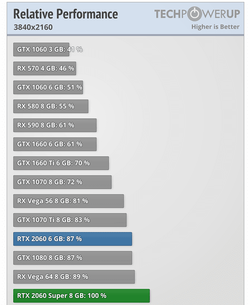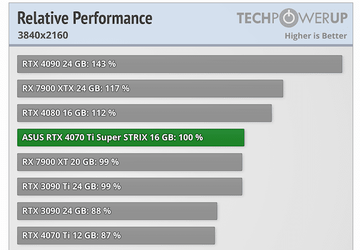Like I said... On it's own... that tells you absolutely nothing.
It does, actually.
I agree FPS is an important metric, but
not for the context you provided initially (performance uptick between non and super cards). You're moving the goalposts from...
I was kind of hoping that this "Super" series would be the HUGE step-up that my 2060 Super was over the regular 2060... (Relatively ED... relatively...) but it doesn't look like that's the case.
to...
If 2% is the difference between 63 and 67fps.. then it doesn't matter. If, that 2% difference is enough to drop you under 60fps... then it MATTERS.
...' What is the average FPS these cards achieve with the increase?'.
In other words, your original assertion that the 4070 Ti S appears to have less of a performance increase over the non-super than the 2060 S is
false (talking 4K where they were both 13% increase over non-super cards). Overall/Relative performance does not come into play unless you expand the scope of your initial statement. I'm trying to compare apples to apples. You're trying to slip an orange in and make a fruit salad!
But, to me... percentages only work in apples-to-apples comparisons. Like "The 2024 Dodge Ram is 6% more fuel efficient than the 2023 model."
% literally takes away the other variables so you can compare them. Adding a relative performance metric, you not only know how much faster that difference is, but you also know how it performs overall!
For simple math's sake, let's say the cards were both 10% faster than their non-S counterparts (b/c the 13% actual I can't do in my head, lol).....
A 10% difference looks like this:
4070 Ti = 50/100/150/200
4070 Ti S = 55/110/165/220 (so +5, 10, 15, and 20 FPS)
2060 = 25/50/100/150
2060 S = 27.5/55/110/165 (so +2.5, 5, 10, and 15 FPS)
Since the 4070 Ti S is a lot faster of a card, assuming the same % difference it will always have more FPS difference than a slower card.
"The 2024 Doge Ram gets 6 more mpg than the 2023 model."
I dunno THAT... makes sense to me. The percentage thing doesn't.
Ok then, let's use this........... the 4070 Ti S gets 26 more FPS than the 4070 Ti, while the 2060 S gets 13 FPS more than the 2060. Using this logic, the 4070 Ti S 'stomps' the 2060 S in FPS gained over their non-S variants, right? Does that help to show you why % is important under the context you set up?
All I'm saying is that the performance difference between the 2 sets of non-S to Super cards is the same, proven in tests. How the cards actually perform is important when trying to get an overall view of the card, but that's not what I'm responding to/what you said initially. I hear what you're saying, and you're not wrong, but you ARE wrong when using the initial context. In other words, the 4070 Ti S step-up is the same as the 2060 S step-up. What those FPS translate to depends on the FPS the cards are getting and is largely out of scope.
@mackerel or
@Kenrou - Not sure I'm getting my point across or understanding his... help?



